|
De Turkse schrijver Orhan Pamuk werd geboren op 7 juni 1952 in Istanbul. Zie ook alle tags voor Orhan Pamuk op dit blog.
Uit: The New Life (Vertaald door Guneli Gun)
“I read a book one day and my whole life was changed. Even on the first page I was so affected by the book's intensity I felt my body sever itself and pull away from the chair where I sat reading the book that lay before me on the table. But even though I felt my body dissociating, my entire being remained so concertedly at the table that the book worked its influence not only on my soul but on every aspect of my identity. It was such a powerful influence that the light surging from the pages illumined my face; its incandescence dazzled my intellect but also endowed it with brilliant lucidity. This was the kind of light within which I could recast myself; I could lose my way in this light; I already sensed in the light the shadows of an existence I had yet to know and embrace. I sat at the table, turning the pages, my mind barely aware that I was reading, and my whole life was changing as I read the new words on each new page. I felt so unprepared for everything that was to befall me, and so helpless, that after a while I moved my face away instinctively as if to protect myself from the power that surged from the pages. It was with dread that I became aware of the complete transformation of the world around me, and I was overtaken by a feeling of loneliness I had never before experienced—as if I had been stranded in a country where I knew neither the lay of the land nor the language and the customs.
I fastened onto the book even more intensely in the face of the helplessness brought on by that feeling of isolation. Nothing besides the book could reveal to me what was my necessary course of action, what it was that I might believe in, or observe, and what path my life was to take in the new country in which I found myself. I read on, turning the pages now as if I were reading a guidebook which would lead me through a strange and savage land. Help me, I felt like saying, help me find the new life, safe and unscathed by any mishap. Yet I knew the new life was built on words in the guidebook. I read it word for word, trying to find my path, but at the same time I was also imagining, to my own amazement, wonders upon wonders which would surely lead me astray.
The book lay on my table reflecting its light on my face, yet it seemed similar to the other familiar objects in the room. While I accepted with joy and wonder the possibility of a new life in the new world that lay before me, I was aware that the book which had changed my life so intensely was in fact something quite ordinary. My mind gradually opened its doors and windows to the wonders of the new world the words promised me, and yet I seemed to recall a chance encounter that had led me to the book. But the memory was no more than a superficial image, one that hadn't completely impressed itself on my consciousness. As I read on, a certain dread prompted me to reflect on the image: the new world the book revealed was so alien, so odd and astonishing that, in order to escape being totally immersed in this universe, I was anxious to sense anything related to the present ».
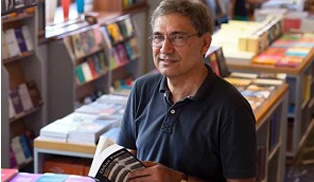
Orhan Pamuk (Istanbul, 7 juni 1952)
De Duitse schrijfster Monika Mann werd als vierde kind van Thomas Mann geboren op 7 juni 1910 in München. Zie ook alle tags voor Monika Mann op dit blog.
Uit:Das fahrende Haus
„Während wir schon bei der nächsten Frage waren, dachte ich blitzschnell – wenn einer übel von meinem Bruder redet, mag ich ihm einen Nasenstüber versetzen ; wenn einer übel von China, Norwegen, Rumänien oder Amerika redet, so ist mir’s einerlei. Denn das sind Begriffe, während mein Bruder ein Individuum, eine Tatsache ist. Ich mag nur für das Individuum den Nasenstüber austeilen ! – Ich zählte langsam, stockend, ich glaub’ ein wenig singend die Staaten auf, nebenher dachte ich wieder blitzschnell – und doch, jene Begriffe mögen Tatsache sein. Der Begriff eines Landes, einer Nation, eines Kontinents, der Begriff « Amerika » wird individuell, verteidigungswert in diesem Menschen, der da als Richter vor mir sitzt. – Kentucky, Tennessee, Georgia, Florida – summte ich, und ich stockte. – In diesem Menschen, der als Richter vor mir sitzt. – Alabama, Mississippi, Louisiana, Ohio, Indiana, Michigan, Wisconsin, Minnesota, Kansas, Nebraska, Colorado, New Mexico, seine Fahne hat 48 Sterne, aber Texas hat nur einen Stern (improvisierte ich), Idaho, Utah, Kalifornien, Oregon, Washington. – In diesem Menschen, der als Richter vor mir sitzt . . . Mir schwindelte.
[. . .]
Und was man sich erworben hat, kann man sich bewahren !
Ich bewahre es mir. Nicht äußerlich – ich bin dabei, das amerikanische Staatsbürgerrecht niederzulegen –, aber innerlich : Ich bewahre mir das Recht, Amerika zu lieben, ihm dankbar zu sein.“
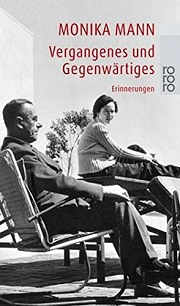
Monika Mann (7 juni 1910 – 17 maart 1992)
Cover
De Amerikaanse dichteres en schrijfster Nikki Giovanni werd geboren op 7 juni 1943 in Knoxville, Tennessee. Zie ook alle tags voor Nikki Giovanni op dit blog.
Always There Are The Children
and always there are the children
there will be children in the heat of day
there will be children in the cold of winter
children like a quilted blanket
are welcomed in our old age
children like a block of ice to a desert sheik
are signs of status in our youth
we feed the children with our culture
that they might understand our travail
we nourish the children on our gods
that they may understand respect
we urge the children on the tracks
that our race will not fall short
but our children are not ours
nor we theirs they are future we are past
how do we welcome the future
not with the colonialism of the past
for that is our problem
not with the racism of the past
for that is their problem
not with the fears of our own status
for history is lived not dictated
we welcome the young of all groups
as our own with the solid nourishment
of food and warmth
we prepare the way with the solid
nourishment of self-actualization
we implore all the young to prepare for the young
because always there will be children.
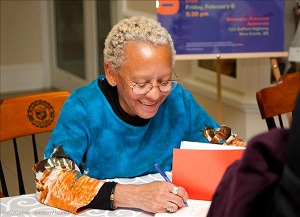
Nikki Giovanni (Knoxville, 7 juni 1943)
De Amerikaanse schrijver Harry Crews werd geboren op 7 juni 1935 in Bacon County, Georgia. Zie ook alle tags voor Harry Crews op dit blog.
Uit:Classic Crews: A Harry Crews Reader
“I picked up a magazine not long ago in which a man was writing about his children. In the very beginning of the piece, he said, “The storms of childhood and adolescence had faded into the past.” He would be the poorer for it if that were true. But it is not true, not for him or for any father. The storms don’t fade into the past, nor do all the moments that are beautiful and full of happiness, the moments that quicken our hearts with pride. In early July of the summer Byron would turn 12, we were sitting on the top of Springer Mountain in Georgia. It was raining and we were soaked and exhausted to the bone, having made the long steep climb of the approach to the Appalachian Trail, which winds its way across the Eastern united States and finally ends on Mount Katahdin in Maine. Between us, embedded in the boulder on which we were sitting, was the metal image of a young hiker.
Byron put his hand on the stone and said, “Well, we made it to the beginning.”
And so we had, but a hell of a beginning it had been. It hadn’t stopped raining all day as we’d climbed steadily over broken rock. He was carrying a 20-pound pack and mine weighed 45, both probably too heavy, but we’d decided to pack enough with us so that we could hike for as long as we wanted to without getting out of the mountains to restock our supplies. I had put him in the lead to set the pace.
“Remember, we’re not in a hurry,” I called after we’d been going awhile. “This is not a goddamn contest.”
I was forced to say it because he’d taken off over the brutally uneven trail like a young goat. He’d looked back at me for only an instant and kept climbing.
Then, as the mud and rock made the footing more and more unsure, I said, “You think we ought to find a place to wait out this rain.”
He stopped and turned for just an instant to look at me. “Did we come to by God hike or did we come to hike?”

Harry Crews (7 juni 1935 – 28 maart 2012)
Cover
De Amerikaanse dichteres en schrijfster Louise Erdrich werd geboren op 7 juni 1954 in Little Falls, Minnesota. Zie ook alle tags voor Louise Erdrich op dit blog.
Indian Boarding School: The Runaways
Home's the place we head for in our sleep.
Boxcars stumbling north in dreams
don't wait for us. We catch them on the run.
The rails, old lacerations that we love,
shoot parallel across the face and break
just under Turtle Mountains. Riding scars
you can't get lost. Home is the place they cross.
The lame guard strikes a match and makes the dark
less tolerant. We watch through cracks in boards
as the land starts rolling, rolling till it hurts
to be here, cold in regulation clothes.
We know the sheriff's waiting at midrun
to take us back. His car is dumb and warm.
The highway doesn't rock, it only hums
like a wing of long insults. The worn-down welts
of ancient punishments lead back and forth.
All runaways wear dresses, long green ones,
the color you would think shame was. We scrub
the sidewalks down because it's shameful work.
Our brushes cut the stone in watered arcs
and in the soak frail outlines shiver clear
a moment, things us kids pressed on the dark
face before it hardened, pale, remembering
delicate old injuries, the spines of names and leaves.
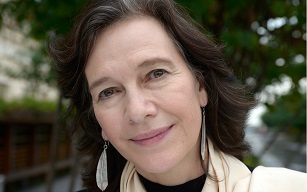
Louise Erdrich (Little Falls, 7 juni 1954)
De Duitstalige dichteres Mascha Kaléko (eig. Golda Malka Aufen) werd geboren op 7 juni 1907 in Krenau of Schidlow in Galicië in het toenmalige Oostenrijk-Hongarije, nu Polen. Zie ook alle tags voor Mascha Kaléko op dit blog.
Die frühen Jahm
Ausgesetzt
In einer Barke von Nacht
Trieb ich
Und trieb an ein Ufer.
An Wolken lehnte ich gegen den Regen.
An Sandhügel gegen den wütenden Wind.
Auf nichts war Verlaß.
Nur auf Wunder.
Ich aß die grünenden Früchte der Sehnsucht,
Trank von dem Wasser das dürsten macht
Ein Fremdling, stumm vor unerschlossenen Zonen,
Fror ich mich durch die finsteren Jahre.
Zur Heimat erkor ich mir die Liebe.
Der kleine Unterschied
Es sprach zum Mister Goodwill
ein deutscher Emigrant
,,Gewiß, es bleibt dasselbe,
sag ich nun land statt Land,
sag ich für Heimat homeland
und poem für Gedicht
Gewiss, ich bin sehr happy:
Doch glücklich bin ich nicht'
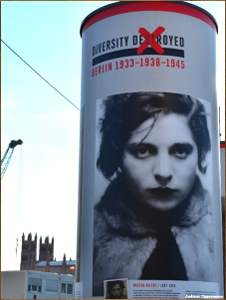
Mascha Kaléko (7 juni 1907 – 21 januari 1975)
De Nederlandse dichter Johannes Aloysius Antonius Engelman werd geboren in Utrecht op 7 juni 1900. Zie ook alle tags voor Jan Engelman op dit blog.
Annabel
Mijn kleine, kleine Annabel
zij zong zo zuiver en zo schel
als fluiten op een glansrivier,
zij was geluk en leefde hier
mijn kleine, kleine Annabel
ik wist uw prille leden wel,
de trilling van die bloemenmond
wanneer een hand uw haren vond
mijn kleine, kleine Annabel
de geest is lang, maar wij gaan snel:
op 't koude laken ligt uw lijf
en ik vind nergens meer verblijf
mijn kleine, kleine Annabel
als ik in hemel of in hel
moet varen met mijn lichte lied,
verloochen, maar vergeet mij niet
Orgelpunt
De man die uwe weelden mint
is weerloos als het kleine kind:
de wereld ging hem vreemd voorbij
als aan zijn borst uw hartslag lei.
Maar wat ons saamgedreven heeft
is wat in kleine bloemen beeft
en gonzend draagt het groot heelal:
't is twee-in-een, en dat is al.
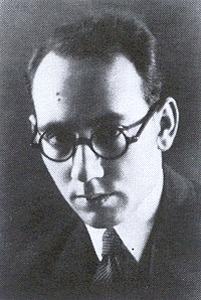
Jan Engelman (Utrecht 7 juni 1900 ;Amsterdam 20 maart 1972)
Begin jaren 1930
De Amerikaanse dichteres Gwendolyn Brooks werd geboren op 7 juni 1917 in Topeka, Kansas. Zie ook alle tags voor Gwendolyn Brooks op dit blog.
The Children Of The Poor
1
People who have no children can be hard:
Attain a mail of ice and insolence:
Need not pause in the fire, and in no sense
Hesitate in the hurricane to guard.
And when wide world is bitten and bewarred
They perish purely, waving their spirits hence
Without a trace of grace or of offense
To laugh or fail, diffident, wonder-starred.
While through a throttling dark we others hear
The little lifting helplessness, the queer
Whimper-whine; whose unridiculous
Lost softness softly makes a trap for us.
And makes a curse. And makes a sugar of
The malocclusions, the inconditions of love.
2
What shall I give my children? who are poor,
Who are adjudged the leastwise of the land,
Who are my sweetest lepers, who demand
No velvet and no velvety velour;
But who have begged me for a brisk contour,
Crying that they are quasi, contraband
Because unfinished, graven by a hand
Less than angelic, admirable or sure.
My hand is stuffed with mode, design, device.
But I lack access to my proper stone.
And plenitude of plan shall not suffice
Nor grief nor love shall be enough alone
To ratify my little halves who bear
Across an autumn freezing everywhere.
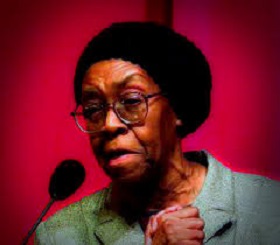
Gwendolyn Brooks (7 juni 1917 – 3 december 2000)
De Ierse schrijfster Elizabeth Bowen werd geboren op 7 juni 1899 in Dublin. Zie ook alle tags voor Elizabeth Bowen op dit blog.
Uit: Friends and Relations
“The morning of the Tilney–Studdart wedding rain fell steadily from before daylight, veiling trees and garden and darkening the canvas of the marquee that should have caught the earliest sun in happy augury. The bride's relations frowned in sleep and were roused with a sense of doom by rain's inauspicious mutter on roofs and windowsills. Clouds with their reinforcements came rolling over the Malvern hills. Till quite late, the rooms at Corunna Lodge were dusky as though the morning had been delayed.
Laurel Studdart herself was not concerned with weather and gave the windows hardly a glance. She and Colonel Studdart, both embarrassed by idleness, frequently met throughout the morning as, straying from room to room, they attempted to efface themselves. Her father had the afternoon on his mind – he had not yet given away a daughter – for her, these hours before her wedding were like a too long wait on the platform of some familiar station from which, virtually, one has already departed, where the very associations become irksome. Her clothes were all packed; she was buttoned into an old blazer of Janet's and did not look like today's bride. From half-past ten till noon she and Colonel Studdart, shut into the morning-room, played demon patience. Her life here was over, his at a standstill; there was nothing for them to do. The morning-room flowers had been 'arranged'; freesia banked the fireplace; Colonel Studdart, from nervousness and a tendency to hay-fever, frequently sneezed. Pollen dashed Laurel's cheek where she had leant excitedly forward across a lily.
The rain stopped before lunch. Later, during the ceremony, the sun came out, parting the clouds widely; so that Laurel's married way down the aisle was gold from successive windows. When she uncertainly smiled in the porch, against strong blasts from the organ rolling out from behind, the umbrellas were finally down; the graves glittered. It was early-closing day, friends from the Cheltenham shops were among the onlookers. The sweet bride, trailing light in her veil, was nodded and smiled to the car where the chauffeur compromised with his impassivity”.
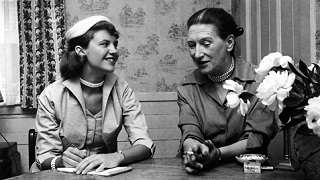
Elizabeth Bowen (7 juni 1899 – 22 februari 1973)
Hier met een jonge Sylvia Plath (links) tijdens een interview
Zie voor nog meer schrijvers van de 7e juni ook mijn blog van 7 juni 2015 deel 2.
07-06-2017 om 18:27
geschreven door Romenu 
Tags:Orhan Pamuk, Monika Mann, Nikki Giovanni, Harry Crews, Louise Erdrich, Mascha Kaléko, Jan Engelman, Gwendolyn Brooks, Elizabeth Bowen, Romenu
|

